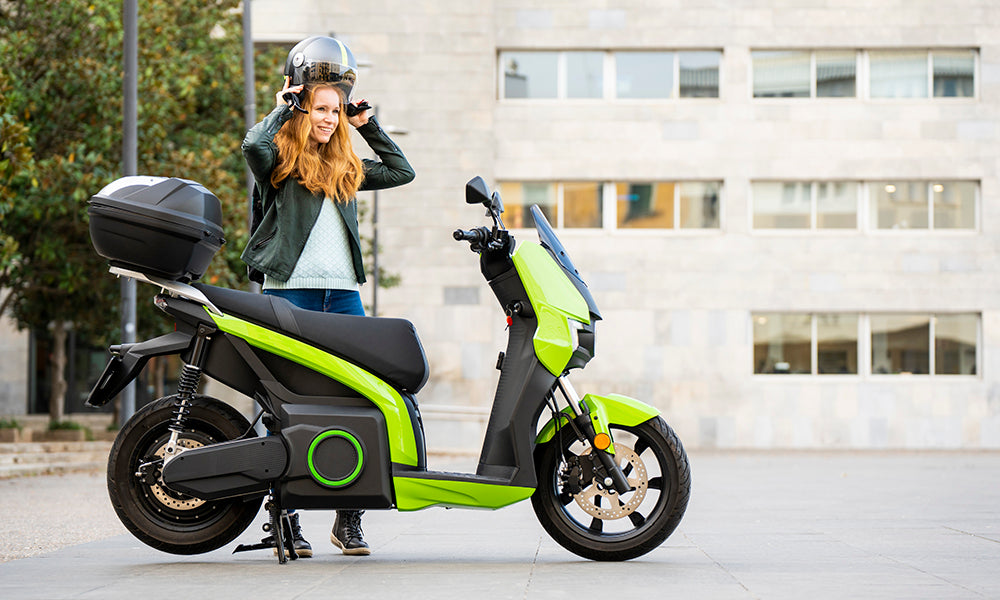Why Should You Switch to an Electric Bike?

As India moves toward a cleaner, greener future, a quiet shift is underway on its streets. The familiar roar of petrol engines slowly gives way to the silent, efficient glide of electric bikes and scooters.
Electric two-wheelers offer a tempting alternative for city commuters battling daily traffic, rising fuel prices, and growing environmental concerns. But is switching to an electric bike the right move for you?
This guide explores the key benefits, trade-offs, and essentials, like electric bike insurance to help you make an informed decision.
Why Electric Two-Wheelers Are Gaining Popularity in Indian Cities?
From Bengaluru to Delhi, EV adoption is no longer a niche trend. The Indian government’s FAME II subsidy, soaring petrol costs, and increasing environmental awareness have made electric bikes and scooters more accessible and attractive.
Whether you're a student looking to save on fuel or a working professional seeking a sustainable commute, electric bikes now offer modern features like smartphone connectivity, GPS tracking, and remote locking, making them just as functional as traditional bikes, if not more.
Upfront vs Long-Term Costs—Are Electric Bikes Actually Cheaper?
While the initial price tag of an electric two-wheeler may be slightly higher than that of a petrol-powered scooter, the real savings lie in long-term use.
Here's what your costs could look like:
- Electric scooter: ₹1.0–1.5 lakh upfront
- Charging cost: ₹20–30 per full charge
- Range: 80–120 km per charge
- Petrol scooter: ₹80–100 per litre + regular servicing
In many cases, riders recover their investment in under two years. Also, state and central government incentives make the deal sweeter, especially in Delhi, Maharashtra, and Gujarat.
However, do factor in battery replacement after 3–5 years. Though it can cost ₹30,000–₹50,000, good battery care and a strong electric bike insurance policy can reduce financial risk.
Can You Rely on an Electric Bike for Daily Use?
Absolutely, if your daily rides are under 100 km. Modern electric scooters are well-suited for city commuting, offering:
- Smooth ride quality, especially in stop-and-go traffic
- Zero clutch work, making them beginner-friendly
- Quick acceleration, thanks to instant torque
- Lower noise, contributing to reduced noise pollution
The key factor to consider is charging. Range anxiety becomes a non-issue if you have access to a home plug point or your office supports EV charging.
What Makes Electric Bikes Easier to Maintain?
Electric bikes win hands down when it comes to maintenance. Upkeep is minimal with fewer moving parts and no engine oil or fuel systems to worry about. Most riders only need to focus on tyres, brakes, and the battery. But just like with any vehicle, the unexpected can still happen, whether it’s a minor accident or a sudden part failure.
This is where having the right electric bike insurance makes a difference. Insurance providers like Digit Insurance have over 9000 cashless network garages across India, giving riders confidence that help is available when it’s needed most, without long delays or complex processes.
Here is a quick review of what an electric two-wheeler insurance usually includes:
- Covers repair costs from crashes or collisions
- Some plans include cover for critical EV components such as the battery and motor
- Provide financial coverage if your EV is stolen or is beyond repair
- Protection from floods, fire, storms, or earthquakes
- Provide legal coverage in case of damage or injury to others
- Provide add-ons such as roadside assistance
Next, let's talk about who should or should not switch electric two wheelers.
Who Should (and Shouldn’t) Switch to Electric Two-Wheelers?
Best suited for:
- Urban office-goers
- Students
- Delivery professionals (Swiggy, Zomato, Dunzo)
- Environment-conscious riders
- Those with predictable daily commutes
May not suit:
- Long-distance travellers (yet)
- Those in areas with poor charging access
- Riders needing high-speed highway travel
- People with heavy pillion/luggage needs
Nevertheless, it is beneficial for everyone to consider switching, as modern electric vehicles now offer improved range, speed, and features that meet the needs of most riders, making green commuting more accessible than ever.
Is It Time to Go Green with Your Commute?
Electric bikes aren’t just the future, they’re the present. For most Indian commuters, especially in metro cities, they offer:
- Lower costs
- Easier maintenance
- Quiet, clean transportation
- Tech-enabled features
- Environmental benefits
However, preparation is key. Choosing the right model, having a charging plan, and securing bike insurance can make your green transition smooth and risk-free.
If you're ready to embrace a smarter, greener commute, an electric bike, paired with the right insurance, is your ride into the future.














